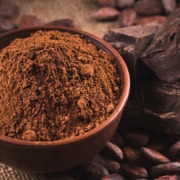Listeria monocytogenes Thermal Resistance in Low-Moisture Foods: Role of Water Activity or Food Matrix
Low moisture foods (e.g., cocoa powder, dried milk powder, flour) have been increasingly involved in foodborne outbreaks. Foodborne pathogens such as Listeria monocytogenes can survive in low moisture foods and dry food processing environments for months, and even for years. However, there is a general lack of knowledge related to the behavior of L. monocytogenes in these foods. The aim of this study is to comprehensively evaluate L. monocytogenes survival in low moisture foods in heat processing, and examine factors impacting their resistance.
Institution: Washington State University
Principal Investigator: Meijun Zhu, PhD
Year Awarded: 2016
Read more: Listeria monocytogenes in Almond Meal: Desiccation Stability and Isothermal Inactivation
Learn more about the IAFNS Microbiology Committee.



